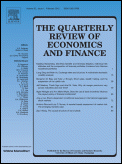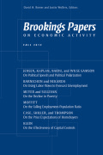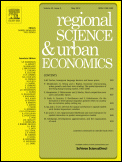
Cuadernos de Economia
Scope & Guideline
Catalyzing scholarly dialogue for a sustainable future.
Introduction
Aims and Scopes
- Economic Policy and Governance:
The journal frequently examines the implications of economic policies and governance structures on various sectors, including the banking and financial industries, corporate governance, and public sector effectiveness. - Development Economics:
It emphasizes issues related to economic development, poverty alleviation, and inequality, focusing on how these factors are influenced by local and global economic trends. - Financial Systems and Markets:
Research often delves into the functioning of financial systems, including banking performance, market responses, and the impact of financial innovations like FinTech. - Sustainability and Environmental Economics:
The journal explores the intersection of economics with environmental sustainability, addressing topics such as green finance, sustainable development goals (SDGs), and the economic implications of environmental policies. - Labor Economics and Social Issues:
The impact of labor market dynamics, employment policies, and socio-economic determinants on labor conditions, particularly in emerging economies, is a recurring theme. - Quantitative and Econometric Analysis:
Many studies employ sophisticated econometric methodologies to analyze economic phenomena, providing empirical evidence that informs both theory and practice.
Trending and Emerging
- Digital Economy and FinTech Innovations:
Recent publications emphasize the impact of digitalization and financial technology on traditional banking systems and market behaviors, reflecting the growing importance of technology in economic frameworks. - Sustainability and Green Finance:
There is a rising trend in research related to sustainability, including the role of green finance and the economic implications of environmental policies, indicating a strong focus on sustainable development. - Corporate Governance and Social Responsibility:
Emerging themes around corporate governance mechanisms and their relationship to social responsibility and sustainable development goals (SDGs) have gained traction, showcasing a growing concern for ethical business practices. - Impact of Global Events on Local Economies:
Studies analyzing the effects of global phenomena, such as the COVID-19 pandemic, on local economic conditions and labor markets have become increasingly prominent, highlighting the interconnectedness of economies. - Behavioral Economics and Consumer Behavior:
Research focusing on behavioral economics, particularly in the context of consumer protection and financial decision-making, is emerging as a significant area of interest, reflecting a shift towards understanding human behavior in economic contexts.
Declining or Waning
- Traditional Macroeconomic Models:
There is a noticeable decrease in papers focused solely on traditional macroeconomic models without incorporating contemporary issues such as sustainability or digital transformation. - Sector-Specific Studies without Broader Context:
Research that examines specific sectors in isolation, without linking to broader economic or social implications, has become less prevalent, indicating a shift towards more integrated analyses. - Historical Economic Analysis:
While historical perspectives are valuable, there has been a reduction in studies that focus exclusively on historical economic data or events, suggesting a preference for current and forward-looking analyses. - Theoretical Frameworks with Limited Empirical Support:
Papers that propose theoretical frameworks without robust empirical validation have seen a decline, as the journal increasingly favors studies that provide empirical evidence.
Similar Journals

Prague Economic Papers
Advancing Economic Thought from the Heart of EuropePrague Economic Papers is an esteemed scholarly journal dedicated to the fields of Economics, Finance, and Econometrics, published by UNIV ECONOMICS-PRAGUE. With its ISSN 1210-0455 and E-ISSN 2336-730X, this journal serves as a vital platform for innovative economic research and theoretical advancement. Operating from the scenic backdrop of the Czech Republic, Prague Economic Papers is recognized in Scopus with rankings that place it in quartile Q4 for Economics and Econometrics, as well as Q3 for Finance, reflecting its growing impact in the academic sphere. Though the journal does not currently offer open access, it ambitiously covers a wide expanse of economic theories and empirical studies, contributing significantly to the evolution of economic thought from 2008 to 2024. Researchers, professionals, and students alike will find this journal essential for accessing critical insights and methodologies that shape contemporary economic discourse.

Indian Journal of Economics and Development
Advancing Economic Insights for Sustainable DevelopmentIndian Journal of Economics and Development, published by SOC ECONOMICS & DEVELOPMENT, stands as a noteworthy platform for scholarly discourse in the fields of economics, business management, and development studies. With an ISSN of 2277-5412 and an E-ISSN of 2322-0430, this journal, based in Ludhiana, India, has been dedicated to advancing research and dialogue since its inception in 2019 and is poised for convergence until 2024. Although currently ranked in the Q4 categories across various disciplines in Business, Management and Accounting, Economics and Econometrics, and Geography, Planning and Development, the journal’s commitment to fostering impactful research is evident in its wide-ranging aims and scope, which seek to explore contemporary economic challenges and developmental issues. While the journal operates without an open-access model, it provides a valuable resource for academics and professionals, and encourages contributions that address both theoretical and empirical questions. Researchers, students, and professionals will find this journal critical as it serves a vital role in the dialogue surrounding economic and developmental dynamics, particularly in an increasingly complex global landscape.

International Journal of Economics Management and Accounting
Cultivating Excellence in Economic and Management ResearchThe International Journal of Economics Management and Accounting, published by IIUM PRESS, is a pivotal platform for researchers, professionals, and students engaged in the vibrant fields of economics, management, and accounting. With an ISSN of 1394-7680, this journal aims to disseminate high-quality research that addresses both theoretical and practical challenges within these disciplines. As an open-access journal, it facilitates greater accessibility to scholarly articles, fostering a collaborative academic environment. The journal welcomes original research, reviews, and commentaries that contribute to the understanding of complex economic systems, effective management practices, and innovative accounting methodologies. Its commitment to advancing knowledge in these areas underscores its importance in the global academic landscape, particularly within the ASEAN region. Submissions are encouraged from a diverse range of perspectives, thus ensuring a rich dialogue among scholars and practitioners alike.

American Economic Journal-Economic Policy
Bridging Research and Real-World PolicyAmerican Economic Journal - Economic Policy, published by the American Economic Association, stands at the forefront of economic research, focusing on significant policy implications and evidence-based evaluations. With an ISSN of 1945-7731 and an E-ISSN of 1945-774X, this esteemed journal has maintained its influence and credibility in the field since its inception in 2009. Ranked in the Q1 category for Economics, Econometrics and Finance and ranking #7 out of 288 in Scopus, it boasts a remarkable 97th percentile ranking, making it a premier source for cutting-edge research and policy discussion. The journal's rigorous peer-reviewed articles aim to bridge the gap between academic research and real-world economic policy, serving as an essential resource for researchers, professionals, and students who seek to engage with and contribute to the evolving landscape of economic policy. With open access options not currently available, readers are encouraged to subscribe or access articles through academic institutions for comprehensive insights into the economic challenges and innovations shaping our world.

Quantitative Economics
Transforming economic research with impactful quantitative findings.Quantitative Economics is a leading open-access journal published by WILEY, dedicated to advancing the field of economics through rigorous quantitative analysis. Established in 2010 and based in the United States, this influential journal boasts an impressive Q1 rating in the 2023 category of Economics and Econometrics, reflecting its high impact and quality within the field. With a Scopus ranking of #222 out of 716 in the Economics and Econometrics category, it sits comfortably in the 68th percentile, underscoring its relevance to researchers and professionals alike. The journal accepts a wide range of submissions, including original research articles, methodological advancements, and comprehensive reviews, which contribute to the understanding and application of quantitative methods in economic research. By providing immediate open access to all published articles, Quantitative Economics ensures that vital findings are readily available to academics, policymakers, and students across the globe, enhancing collaboration and innovation within the discipline.

Annals of Economics and Finance
Fostering Critical Discourse in Economics and Finance.Annals of Economics and Finance is an esteemed academic journal published by Wuhan University Journals Press, focusing on the fields of Economics and Finance. Established in 2000, this journal serves as a platform for scholars to disseminate their research findings and insights, contributing to the development of these disciplines through rigorous peer-reviewed articles. Despite currently holding a Q4 ranking in both Economics and Econometrics and Finance categories (2023), it strives to enhance its impact on the academic community and policy-making audiences. While not Open Access, the journal seeks to cultivate a deeper understanding of vital economic theories and financial practices, thereby offering invaluable resources for researchers, professionals, and students alike. With its broad scope, the Annals of Economics and Finance is poised to play a crucial role in shaping contemporary economic discourse up to 2024 and beyond.

QUARTERLY REVIEW OF ECONOMICS AND FINANCE
Empowering Research, Shaping Economic DiscourseQuarterly Review of Economics and Finance is a renowned academic journal published by Elsevier Science Inc. that focuses on key advancements in the fields of economics, econometrics, and finance. With a commitment to fostering scholarly dialogue, this journal provides a platform for researchers and practitioners alike to disseminate innovative ideas and empirical research, contributing to the economic discourse since its inception in 1992. Recognized for its quality, the journal holds an impressive Q2 ranking in both Economics and Econometrics and Finance, with Scopus rankings placing it in the 81st percentile, underscoring its relevance and impact within the scholarly community. While the journal operates under a subscription model, it boasts a global readership and is accessible to professionals and students seeking insightful and rigorous analyses of contemporary economic issues. With its clear objectives of expanding knowledge and influencing practice, the Quarterly Review of Economics and Finance serves as an essential resource for anyone committed to understanding the dynamics of economics and finance in the modern world.

Montenegrin Journal of Economics
Cultivating a Community of Economic ScholarsMontenegrin Journal of Economics, published by ECONOMIC LABORATORY TRANSITION RESEARCH PODGORICA-ELIT, stands as a prominent platform for scholarly discourse in the field of Economics, Econometrics, and Finance. With an ISSN of 1800-5845 and an E-ISSN of 1800-6698, this open access journal has been providing accessible research output since 2005, contributing significantly to the global academic community. The journal’s impact is reflected in its Q2 ranking in the 2023 category of Economics, Econometrics and Finance, holding a commendable position within the 81st percentile according to Scopus rankings. The scope includes a wide array of topics pertinent to economics and finance, encouraging contributions that enhance understanding of both local and global markets. With a focus on quality research, the journal aims to disseminate knowledge that supports informed policy-making and fosters economic development, making it an invaluable resource for researchers, professionals, and students dedicated to the evolving landscape of economic studies.

BROOKINGS PAPERS ON ECONOMIC ACTIVITY
Shaping Economic Discourse, One Paper at a Time.BROOKINGS PAPERS ON ECONOMIC ACTIVITY, published by Johns Hopkins University Press, stands at the forefront of economic research, providing critical insights and analysis across the fields of economics and econometrics. With a prestigious Q1 ranking in both the Business, Management and Accounting (miscellaneous) and Economics and Econometrics categories for 2023, this journal is renowned for its scholarly contributions that shape public policy and debates within the economic community. Since its inception, the journal has consistently published high-impact research and innovative discussions surrounding economic activity, making it an essential resource for researchers, professionals, and students alike. Although it does not offer open access, its academic rigor and relevance continue to attract a broad readership, contributing to a deeper understanding of economic phenomena in the United States and beyond. For more information, visit the journal’s homepage or the Johns Hopkins University Press website.

REGIONAL SCIENCE AND URBAN ECONOMICS
Unveiling the complexities of regional science and urban economics.Regional Science and Urban Economics, published by Elsevier, is a premier academic journal dedicated to advancing the understanding of spatial dynamics and urbanization. With an ISSN of 0166-0462 and E-ISSN 1879-2308, this journal has established itself as a vital resource for researchers and practitioners in economics and urban studies, boasting a remarkable impact factor and ranking in the Q1 category for both fields. Since its inception in 1975, the journal has provided a platform for high-quality research that examines both theoretical and empirical aspects of regional science and urban economics. With a Scopus rank of 47th in Urban Studies and 157th in Economics, it ensures that the latest findings reach a wide audience. Researchers interested in exploring spatial economics and urbanization trends will find this journal indispensable for staying at the forefront of their fields, facilitating collaboration and innovation in addressing contemporary urban challenges.